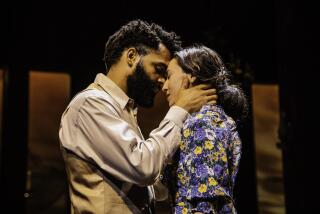Book Review: Treasured memories of a beloved brother
- Share via
Anton Chekhov
A Brother’s Memoir
Mikhail Chekhov, translated from the Russian by Eugene Alper
Palgrave Macmillan: 230 pp., $25
Anton Chekhov’s life is well documented: When he died of consumption in 1904 at age 44, he was honored all over the world. His short stories, plays and journalism are still upheld as models of humane perception and imaginative compassion. That their short fiction is “Chekhovian” is the compliment we pay to contemporary masters such as Alice Munro and William Trevor. No month goes by without a performance somewhere of “Uncle Vanya” or “The Seagull” or “The Cherry Orchard.” Chekhov’s admirers are legion and vie to take stage center in the ongoing chorus of praise.
So there seemed to be little new to say about the good doctor who also happened to be a great Russian writer. First published in 1933 and much referred to as source material in more formal biographies (such as those by David Magarshack, Philip Callow and Rosamund Bartlett), “Anton Chekhov: A Brother’s Memoir” now finally has been translated into English, and it is rich in remembered details: who visited the family when, who drank what where, who tilled which field and gave which speech and made how many rubles and kopecks with which publication. Mikhail Chekhov remembers everything, it seems, and tells us like an aging, garrulous relative more than we need or want to know about the bygone days. At times this is amusing:
“Once Pavel, Anton, Timofeev, and I went to the Psiol to swim. When Timofeev took off his shoes, we were surprised to see that one of his heels was dark yellow. I am not sure if he had applied iodine to it or if he had been born like this. As soon as Anton noticed it, he asked the professor very seriously, ‘Vladimir Fiodorovich, when you smoke, how far do you keep the cigarette from your heel?’ We all burst out laughing, especially Pavel.”
At other times, the book is keen-eyed and grim:
“Anton did not like to let on when he was feeling unwell. He was afraid of worrying us, or maybe he didn’t want to admit it, even to himself. In any case, he wrote to Suvorin that he was willing to drink quinine and take whatever medicine was necessary, but he would not allow any doctor to listen to his lungs. Once, I saw flecks of blood in his phlegm, but when I asked him what was wrong with him, he acted embarrassed, and concerned by his oversight, he quickly washed the phlegm away, saying, ‘It’s nothing.... Don’t say anything to Masha and Mother.’ To top it all off, he developed an excruciating ache in his left temple, which caused his eye to blink uncontrollably. But all these ailments would come and go, and when they were gone our Anton Pavlovich would be merry, work hard, and forget his recent pain.”
Yet all too often we are told, at chapter length, about “Our Ancestry,” “Our Childhood in Taganrog,” “The Early Years in Moscow,” “The Moscow Literary Magazines,” as though they were of self-evident interest and a priori consequence; the author makes no effort to explain or describe Chekhov’s particular gift. His elder sibling does appear to have been jovial and convivial as well as a prodigious drinker; we learn about the writer’s pranks, his search for a house, his health and romantic attachments and, when he farmed, about his harvest. But we learn nothing of the work itself, except how much it sold. What’s on offer here is a gossipy remembrance of a beloved brother by a man who continues to miss him. And who ends his book quietly, movingly:
“Brother Anton was lowered into his grave, next to our father. We looked at the coffin for the last time and each threw down a parting handful of earth — it made a knocking sound. Then they covered the grave and the famous author with it.”
Delbanco is the Robert Frost Distinguished University Professor at the University of Michigan. His most recent novel is “The Count of Concord.”
More to Read
The biggest entertainment stories
Get our big stories about Hollywood, film, television, music, arts, culture and more right in your inbox as soon as they publish.
You may occasionally receive promotional content from the Los Angeles Times.










